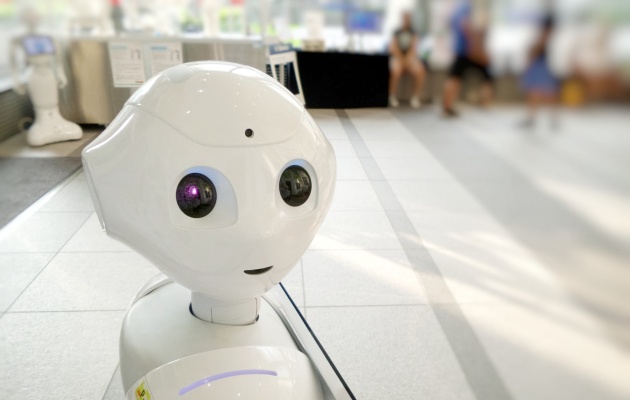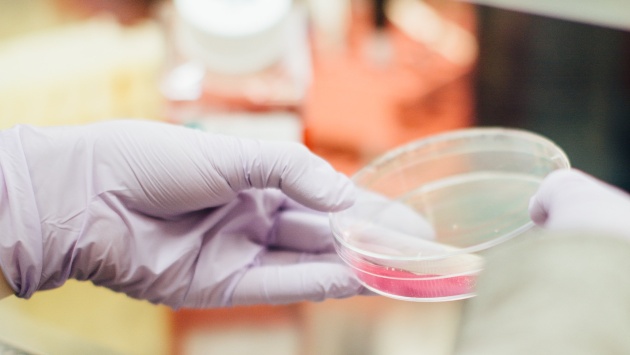John Wyatt in an in-depth interview about Artificial Intelligence, abortion, euthanasia, and creation care: “There is an urgent need for us Christians to build a bridge between the world of the historic biblical faith and these very new and challenging issues”.
![John Wyatt spoke about Artificial Intelligence, abortion, euthanasia, and creation care, in an interview with Evangelical Focus. / Video capture: [link]Evangelical Focus[/link].](https://cms.evangelicalfocus.com/upload/imagenes/637613cb97b28_johnwyattphotoevangelicalfocusCropped.png) John Wyatt spoke about Artificial Intelligence, abortion, euthanasia, and creation care, in an interview with Evangelical Focus. / Video capture: [link]Evangelical Focus[/link].
John Wyatt spoke about Artificial Intelligence, abortion, euthanasia, and creation care, in an interview with Evangelical Focus. / Video capture: [link]Evangelical Focus[/link].
Euthanasia, Artificial Intelligence, creation care, abortion. Countless books have been written about these highly topical issues, and the heated debates in the media ultimately shape the vote of all of us.
They all have in common, too, that they must be approached from a perspective of bioethics to make sure a difference is made in the life of people and the sustainability of the planet.
Christians, believes Professor John Wyatt, should strive to develop clear and differentiated thinking on all these burning issues. The expert from the UK has written books and other resources such as podcasts, and is often invited to speak at conferences, such as the Jornadas de Bioética, a conference organised once every decade by evangelical Christians in Spain.
In an interview with Evangelical Focus, John Wyatt addressed some of the burning bioethical questions of the moment in Europe. Listen and watch the interview.
Question. In the 2000s, it was said that the priority was to learn computer programming. In the 2010s, to exploit social media. And in the 2020s, to understand Artificial Intelligence. What does someone who hasn’t yet taken much interest in AI need to know about how these technologies change our lives?
Answer. There is no doubt that Artificial Intelligence is an incredibly important form of technology which is already changing our lives in lots of ways that we don’t see. I think that when historians of technology look back on the 21st century they will say that this was a revolution taking place in front of our eyes. Of course, in the middle of a revolution, it is very, very hard to get your head around it. All of us are struggling to understand what is the significance of what is going on.
In a nutshell, it is clear that computer technology is reaching an extraordinary level of power and sophistication. AI is able to many things that are simply not possible for the human brain to fully understand.
[destacate] AI: “When historians of technology look back they will say that this was a revolution taking place in front of our eyes”[/destacate]This is leading to a great deal of confusion and questioning, and part of the issue has to do with science fiction. Novelists, dramatists, filmmakers, have been exploring questions of artificial intelligence for the last one hundred years, before the technology became a reality. Now that science and reality is catching up with science fiction, there is a very interesting connection between the fiction and the way technologists are bringing it into reality.
[photo_footer] Photo: Processed Photography, Unsplash, CC0. [/photo_footer]
Question. One of the projects you collaborate on is TechHuman, a website to help churches think about how technology affects our humanity. Is it only us Christians who are lagging or is everyone in society equally lost?
Answer. It is true that everybody is grappling with what is going on. But perhaps there are particular problems for Christians. Partly, this is because many Christian teachers and pastors, come from a Humanities background. They do not come from a science and technology background - these are not issues that interest them particularly and so they tend to ignore the area of science and technology.
[destacate] “Many Christian teachers and pastors come from a Humanities background, so they tend to ignore the area of science and technology”[/destacate] So, it is often the younger people, the digital natives, who spend a lot of time in the online world, who are much more aware of the power of technology. And yet often it is the older people’s voices that we hear preaching and speaking in church.
And another reason for a certain disconnect is that quite rightly, as Christians we look back over the history of Christian thinking for the last 2,000 years. I myself in my work on bioethics have tried to grapple with what the Church Fathers said about abortion and about suicide, and so on. But when we come to these modern issues, we find that in our Christian tradition, not surprisingly, there is very little that seems relevant, and not much thinking has been done previously.
So, how should we think about machines that appear to be intelligent? Machines that can replicate in some ways our own human thinking?
I do think there is an urgent need for us Christians to try to grapple with these issues and to try to build a bridge between the world of the historic biblical faith and these very new and very challenging issues that we are now facing.
Question. Changing the subject to euthanasia… You have extensive experience as a medical doctor, you have been involved in research, you have been part of the conversation on a high level. But you have also talked to many patients face to face. What have you learnt that you explain in your book Dying Well (IVP, 2018)? What are the main ideas?
Answer. One of the positive things of the whole debate about euthanasia going on across Europe is that it is helping people to think more about what it is to die well. Instead of just pushing this into the background and saying, ‘we don’t want to talk about dying’. So, at least, the topic is on the agenda and I’m convinced that Christians have a very particular perspective on this, which is why I wrote the book Dying well.
[destacate] “The political situation in the USA has enormous influence here in Europe, and yet the situation there is very, very different”[/destacate] I tried to recover an old tradition in the Christians history which goes back to Medieval Europe, writings called ars moriendi, in Latin “the art of dying”. I’m trying to rehabilitate and reimagine that vision for the 21st century, as a kind of self-help way for Christians who are approaching death or helping others, by giving them resources.
Dying well is actually a wonderful opportunity. I’ve seen time and time again, that those last hours, days, and weeks have been an incredibly rich time in discovering purpose, meaning, forgiveness of relationships, fulfilling dreams, passing on a legacy… There are many things that can happen.
But at the same time, I want to address some of the fears and anxieties about death and dying such as pain and the loss of meaning, what I call the dangers and temptations of dying. I want to help people see that in the Christian faith, dying becomes a gateway from this present into a new prospect. There is a future, not just a look to the past.

[photo_footer] Photo: Aaron Andrew Ang, Unsplash, CC0. [/photo_footer]
Question. Pressure on the weak is often mentioned as the main risk of misusing legalised euthanasia. Frail people deciding to ask for assisted suicide because they are in an environment where they see themselves as a “problem” for those around them.
Answer. I do think this is one of the most worrying aspects of the legalisation of euthanasia. There are many reasons why making this a legal process is unhelpful. But the most worrying is these subtle pressures on the elderly and disabled people.
What seems to be so terrible is that this is presented almost as a form of altruism. It is a way of addressing elderly people and saying, ‘maybe the most loving and caring thing you could do for your relatives, children, and loved ones is to allow yourself to be killed’. This seems such a corruption of the truth and of the Christian way of understanding life as a gift from God.
I am very concerned about this. There are many, many people in our societies in Europe who are lonely and feel that life has no purpose. And we already start to see pressure, especially in places such as the Netherlands, that when I feel that my life is pointless, I should have the right to be able to kill myself. This seems to me a policy of despair and hopelessness.
Whereas Christian thinking always says life is precious. Therefore, Christian love says, ‘it’s good that you exist, it’s good that you’re in the world’. This is something that we are called to say to each other. What euthanasia says is the opposite, ‘actually, it would be much better for the world if you didn’t exist’. That seems to me to be a perversion of Christian love.
Question. Often, also among Christians, we hear the argument that theology and theory are all very well, but when it comes down to a person suffering intensely for a long time, that persons should be able to choose to die in a planned and safe way. What would your response be?
Answer. Of course, this is a very important issue and Christians are sometimes caricaturised as sadists or masochists, as if we actually celebrated that people are in agony. That’s completely wrong.
As followers of Christ, we are deeply concerned to show compassion to suffering people, and that compassion has led to the development and involvement of Christians in healthcare and other areas of medical care for centuries.
[destacate] “Whenever we say, ‘something is wrong from a Christian perspective’, we must immediately add, ‘and here is a better way, a more positive response’”[/destacate] But it is important to understand that suffering is a much more complex phenomenon than what people often imagine. Many think that suffering at the end of life is basically a physical phenomenon, in which drugs sometimes work and sometimes don’t, and in that case there is nothing else that can be done. That could not be further from the truth.
One of the pioneers of palliative care, which started in the UK with people like Cicely Saunders, a Christian physician. She recognised that suffering has many components, but in particular, there were: physical pain, relational pain, psychological pain, and spiritual pain. Of those four kinds of sufferings, all doctors discover that the physical pain is the easy pain to eradicate. There is no fundamental reason these days why anybody facing death should have terrible physical pain. The problem kinds of pain are the other kinds of pain: psychological pain (when there is anxiety, depression, morbid thinking), relational pain (so often there are broken relationships, there is guilt, there’s antagonism), and then spiritual pain (many people at the end of their lives face feelings of guilt, failure, meaninglessness and the pointlessness of existence). These are the factors that cause the greatest suffering at the end of life. And what we have discovered is that rather than just obliterate the person by euthanasia in order to get rid of the pain, it is much better to address the root causes.
So, if there is psychological pain, there should be support, companionship, talking therapies if necessary. If there is relational pain, we try to find reconciliation between people. And finally, if there is spiritual pain, we have to address it by giving opportunities for redemption, forgiveness, Christian worship, prayer, the Holy Communion, and so on. There are so many things we can do to address pain rather than seeing it as something completely hopeless.

[photo_footer] Photo: Drew Hays, Unsplash, CC0. [/photo_footer]
Question. Abortion is back on the scene after the overturning of Roe v. Wade in the US. At the same time, the European Union is pushing abortion as a “fundamental right” (European Parliament vote July 2022) and asking all countries to see it as a “core European value”. How do you see these current socio-political trends?
Answer. It is an extremely confusing, contested, and polarised situation. The political situation in the USA has enormous influence here in Europe, and yet it is important to understand that the situation there is very, very different from our experience in Europe.
Sometimes it is unhelpful to try to make simplistic comparisons. Particularly in the USA, abortion has become the most extremely polarised, toxic, political issue, and many people say it is going to be one of the major influences in the next Presidential election. And because it is central to the political debate, it becomes hugely toxic and polarising.
[destacate] “As soon as we have chosen the language we wish to use, we are already expressing a position”[/destacate] What we see in the States, and to a lesser extent, also in Europe, is that law is a very blunt instrument. Although law is important, it is not in my view, the fundamental issue in abortion. The fundamental issue is the change in attitudes towards sexuality and pregnancy. What we have seen over the last 60 or 70 years is an extraordinary revolution in people’s attitudes to sexuality. For instance, here in the UK, the median onset of regular sexual intercourse is around 16 or 17 years. And yet, the median age when a woman wants to have a first baby is 30 years. That tells us that large numbers of people in our society are wishing to have regular sexual intercourse but not a baby. This seems to me to be the fundamental issue that lies behind the whole question of abortion and other related issues. I’m a believer in the slogan “our goal is not to make abortion illegal but unthinkable”. Our primary aim is to help change people’s thinking and attitudes towards sexuality, relationships, pregnancy, and so on.
We see over time that social attitudes do change. We’ve seen remarkable changes over the centuries, for example in attitudes towards slavery or disabled people. And by God’s grace, it would be possible to see change over time in people’s attitudes towards pregnancy.
I think as Christians we should be putting forward a positive rather than an exclusively negative perspective. So rather than Christians saying, ‘we are against abortion and taking unborn lives’, we should say positively, ‘this is the Christian understanding of how precious life is’. Whenever we say, ‘something is wrong from a Christian perspective’, we must immediately add, ‘and here is a better way, a more positive response’.
I am personally part of a pregnancy centres movement of Christian volunteers and professional counsellors offering high quality counselling and practical support for women and their partners who have an unplanned pregnancy. That seems to be a much more positive and compassionate response to the issue of abortion.
Question. A lot of the of the abortion debate has to do with at what point we can talk about a human being or a baby. Language seems to be crucial: in Spain, for example, the government uses the term “Voluntary Termination of Pregnancy”, and in the annual reports with statistics only the abbreviations “IVE” is used. Why are definitions important in the debate around life and abortion?
Answer. It’s important to understand that in this particular debate there is no neutral language. As soon as we have chosen the language we wish to use, we are already expressing a position. If you talk about the ‘unborn baby’, you are already taking a moral position about the significance of the being in the womb. If you talk about a ‘pregnancy or a foetus’, again you are already taking a moral position; in this case, that this being is disposable.
[destacate] “Historically Christians have been rather late to understand that creation care is in fact a central part of our calling to be followers of Christ”[/destacate] It is fascinating to see this in the medical world. In the antenatal clinic, when an ultrasound is being performed, the most important thing for the medical professional is to work out whether the baby is wanted or not. If the baby is wanted, the medical professional will use baby language, saying, ‘oh, look, the baby is waving her arm, he’s got his daddy’s nose, she is looking very active today’, etc. The language is personal, compassionate and caring. But if the pregnancy is unwanted, the attitude is very different: the screen is turned away from the mother, and the professional now uses language that is much more technical, neutral, and scientific. And yet the being in the womb is exactly the same.
This is the kind of double thinking that modern people have found themselves in. We’re celebrating the importance of mothers to grieve the miscarriage of a baby, which recognises the emotional and moral importance of an unborn child. And at the same time, we’re saying, ‘every woman has the right to destroy the baby in their womb, this is a human right’. There is a deep confusion here.
But we should not be surprised about the concentration on language. An old proverb says: “the beginning of wisdom is to call things by their proper names”. And we find in the biblical narrative that there is a constant attack on language. In Genesis chapter 3, the very first thing that the evil one says is: ‘did God really say?’ There is the twisting and manipulation of what God said to the human couple. So, the attack on language often comes before a change in practice and behaviour.

[photo_footer] Photo: Thijs Stoop, Unsplash, CC0. [/photo_footer]
Question. At the Bioethics conference organised by evangelical Christians in Spain you will also talk about the care of creation. Concepts such as sustainability or the fight against climate change are very common in political and mediatic discourse at the moment. What differential contribution can Christians make?
Answer. I think it is wonderful that we are combining in the conference both the concern for human life (bioethics) and the concern for the entire creation (creation care). So often these issues have been thought of as entirely separate concerns, but at root they are all fundamentally about the glory and honour of God. It is recognising God’s honour and glory as the creator both of every individual human life, and therefore of its unique given status; but also of the entire cosmos, which God has created, again, as a reflection of his own glory, as we see in the Scriptures.
[destacate] “Creation is a gift of the Giver, the one who is constantly reaching out to us in the cosmos”[/destacate] I’m afraid that historically Christians have been rather late to see these connections, to understand that creation care is in fact a central part of our calling to be followers of Christ. It has often been secular thinkers, ecologists and environmental scientists who have been at the forefront. But I’m very glad to say that many Christian teachers and Bible scholars are now recognising the importance of creation care.
As Christians we have a distinctive voice. In the secular world so much is based on protecting ‘Nature’ with a capital “n”. There is the idea that we should somehow look after nature but there is no personal element in it. As Christians, we understand that creation is a gift and we celebrate the Giver, the one who is constantly reaching out to us in the cosmos, the one who’s glory, power, and nature is reflected both in the cosmos and in the human beings that are part of the created order.
Question. Finally, many of parents and look towards the future with uncertainty. How do you imagine Europe in 2050? What should Christians do now to influence our society well?
Answer. I completely understand the concern. I have recently become a grandfather, and as I look after my grandchildren, I’m thinking, ‘what kind of world are we bringing them into? What challenges will they face? How are they going to be able to follow Christ?’
It is fascinating that when God appears in the biblical narrative and reveals himself in a new way, so often the first thing he says is, ‘don’t be afraid’. Whatever the challenges and difficulties that we face, we need to remind ourselves that God is the Lord of history and that we shouldn’t be afraid. In fact we should be excited about the new challenges and possibilities.
[destacate] “A small number of Christians being faithful to Christ can have an extraordinary influence in society”[/destacate] I think we should be focusing again on the two metaphors Jesus used, ‘you are the salt of the earth, you are the light of the world’. And those metaphors are extremely encouraging because you do only need a tiny little bit of salt to have a very great disinfectant and preservative effect. The same is true in Christianity. A small number of Christians being faithful to Christ can have an extraordinary influence in society. This is also true with light, you only need a very small amount to penetrate into a large area of darkness.
It seems to me that these metaphors of salt and light are very positive and encouraging. But of course, our challenge is: are we really being genuinely salty? Are we really maintaining our Christian distinctives? Are we really allowing our good deeds, as Jesus says, to penetrate and illuminate the world and to bring light into those dark areas which people want to keep hidden?
I think that by God’s grace, if we can continue to function as salt and light, we can trust him to what his purposes and plans are, and how they will ultimately be resolved as we finally come to the formation of the new creation. All these issues will ultimately be resolved, and the glory and honour of the nations will be brought into the new Jerusalem.
LISTEN to the audio version of the interview:
[donate]

Las opiniones vertidas por nuestros colaboradores se realizan a nivel personal, pudiendo coincidir o no con la postura de la dirección de Protestante Digital.
Si quieres comentar o